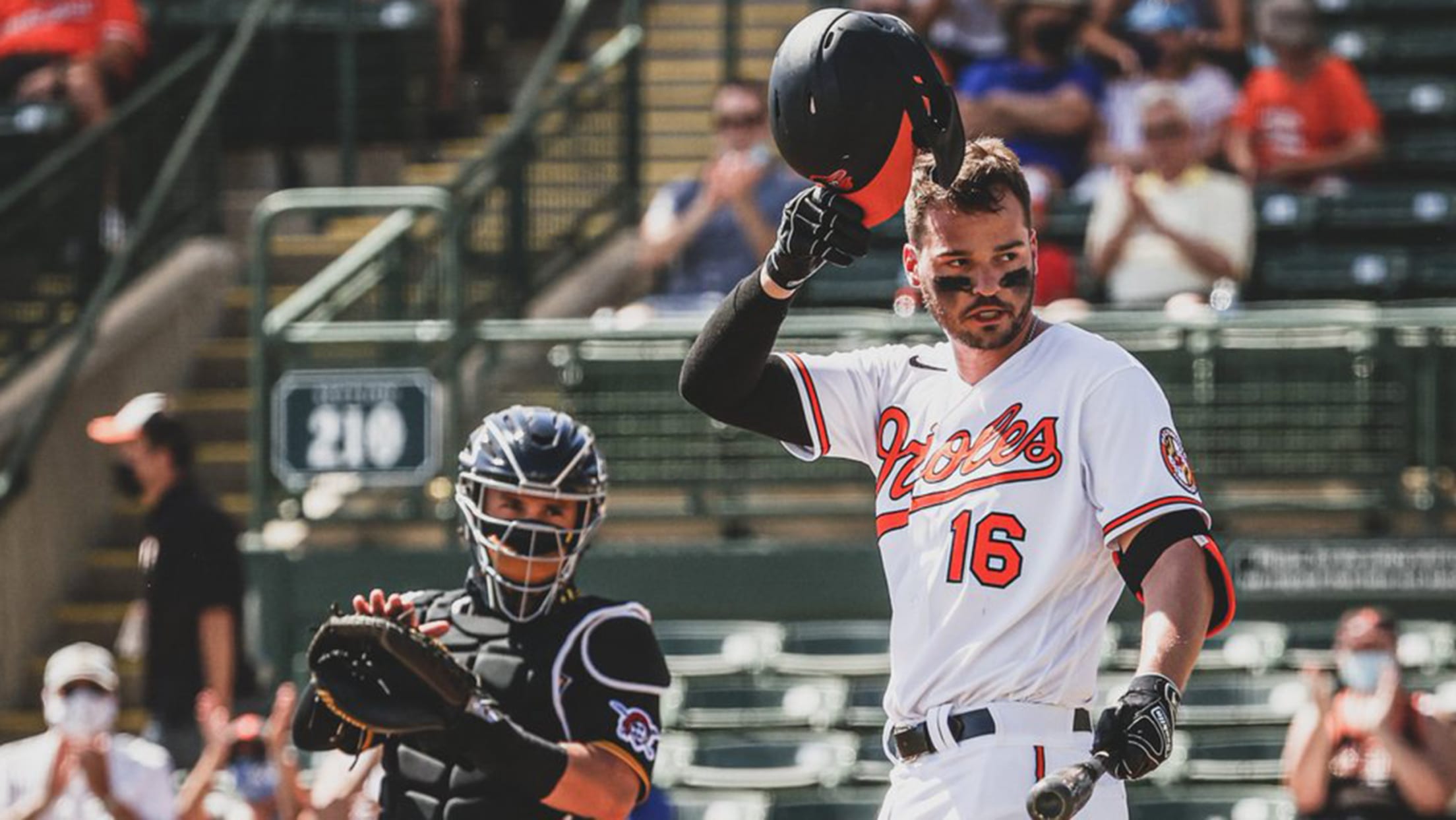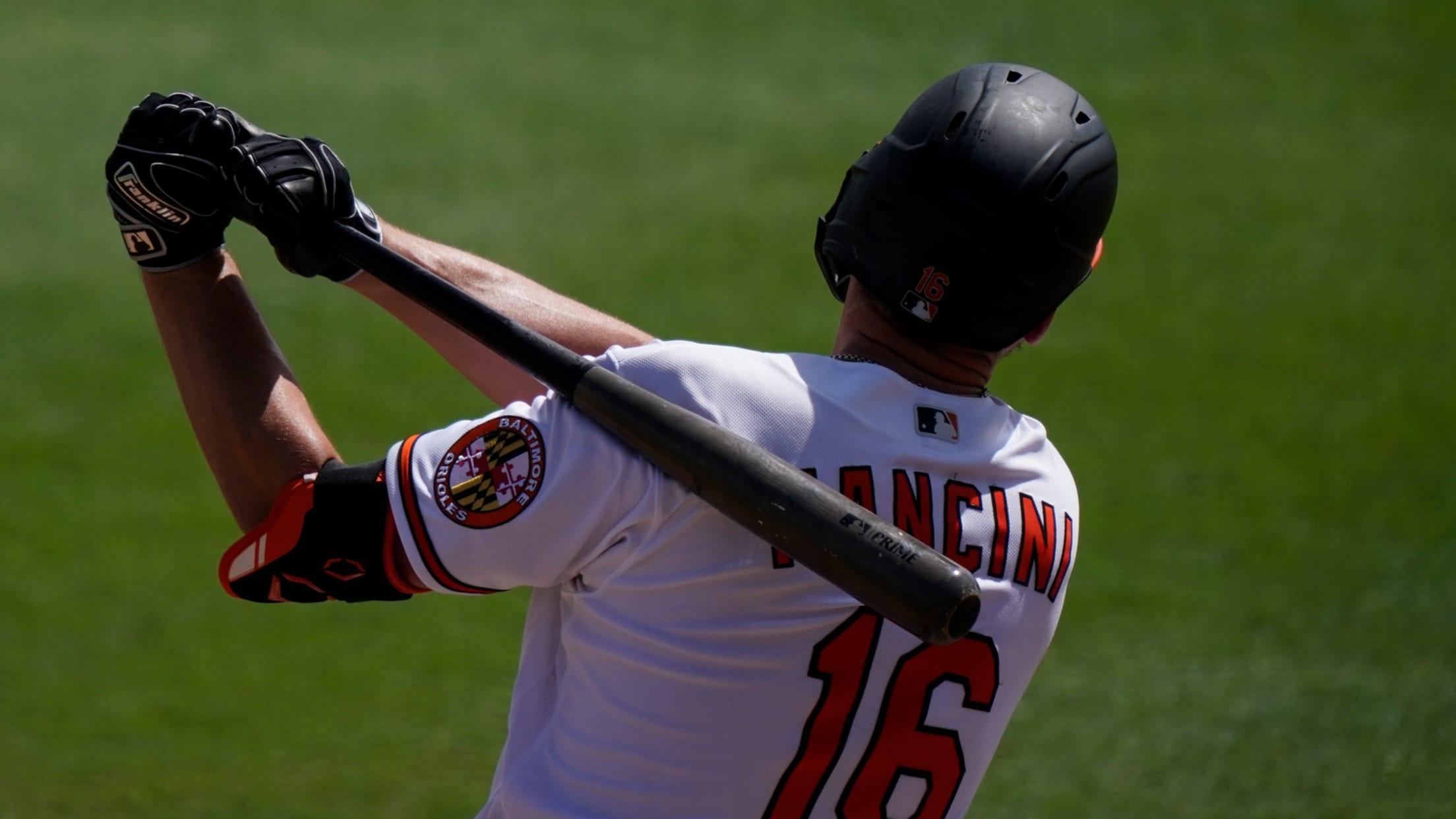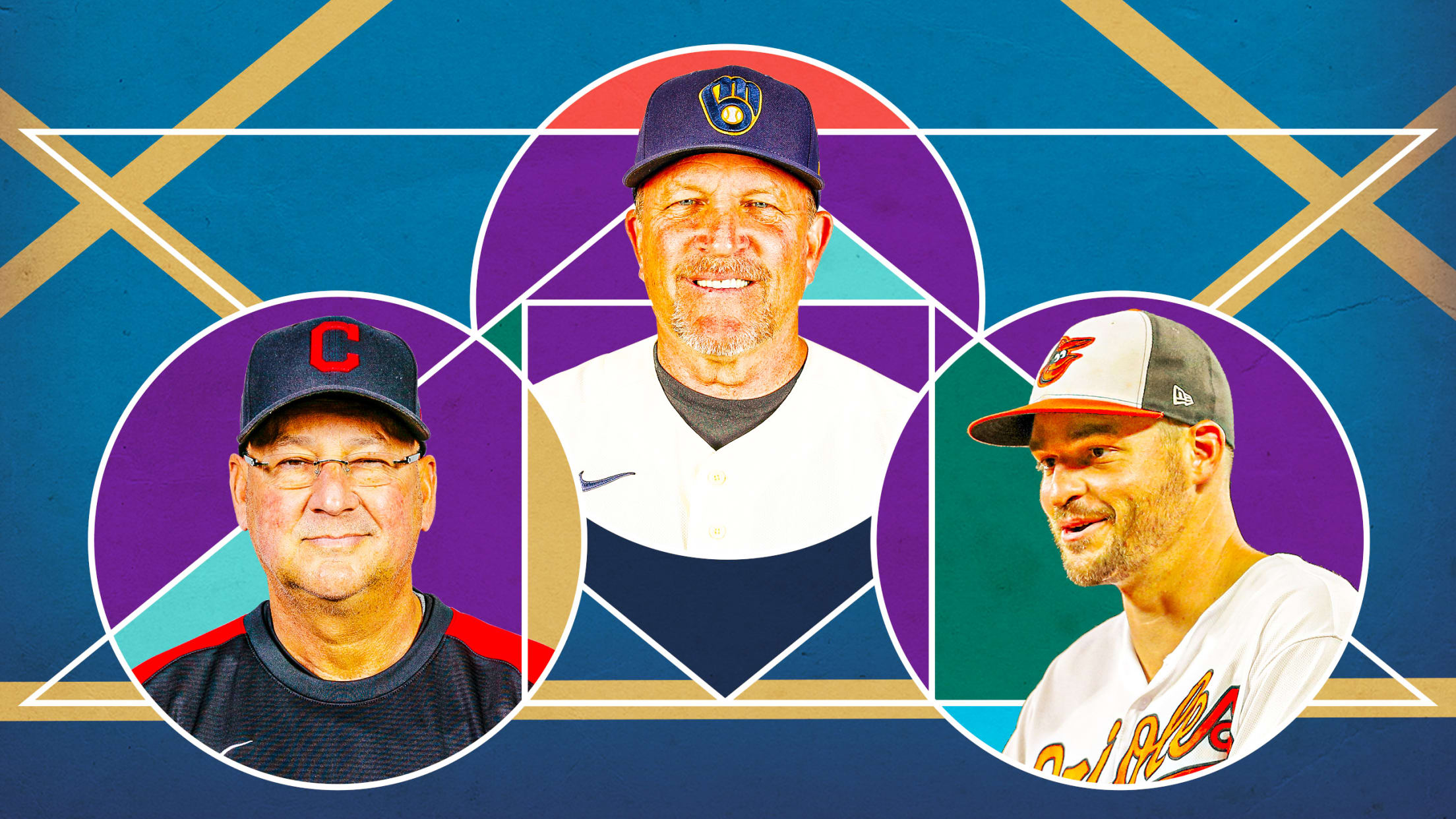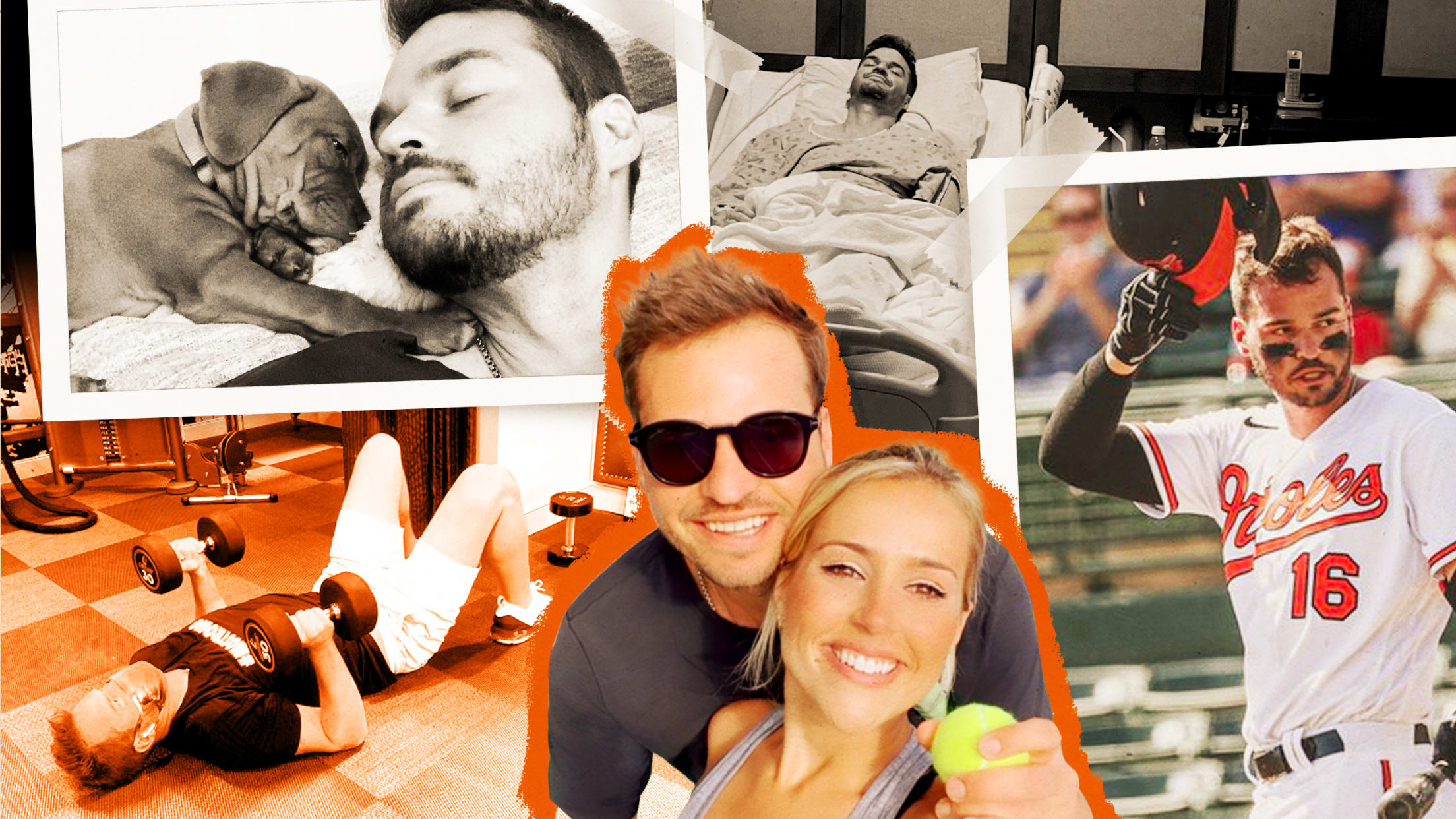
Inside Mancini's inspiring return to baseball

Nearly a year to the day before Trey Mancini’s emotional return to the field in late February, his parents, Tony and Beth, made the two-hour drive from their Winter Haven, Fla., home south to Sarasota, where the Orioles convene for Spring Training, in a state of shock.
They’d just received a call from Trey’s girlfriend, Sara Perlman, who handed the phone to a doctor to relay disquieting news: The mysterious fatigue spelling Trey all spring wasn’t the result of a gluten intolerance, like originally hoped. The colonoscopy Mancini underwent that morning revealed a malignant tumor. Mancini had been feeling sluggish for weeks, and the family weren’t strangers to colon cancer, which Tony had beaten years earlier at age 58. But Beth decided that morning to stay home in part because the odds of such a grave revelation were so remote. A malignant tumor? It was an outcome nobody expected, not for an otherwise healthy professional athlete not two weeks shy of his 28th birthday.
From there, Beth remembers, “Everything happened very quickly.” She phoned Tony, who is a physician, the news, pulling him out of a meeting. From the car they dialed their eldest daughter, Katie, then alerted their younger daughter, Meredith, at work in New York City. They pulled into the parking lot at the Orioles’ spring facility anxious and somber, then huddled with Trey, O’s manager Brandon Hyde, GM Mike Elias and members of the team training staff in Hyde’s office, their world entirely upended.
“Up until that point, most of my biggest problems or worries were all baseball related,” Trey Mancini said later. “Going through a slump was maybe the worst thing I had gone through, personally, and I'm very lucky to have said that at that point. I’d never been through anything like this with me or a family member. So it definitely put a lot in perspective.”
In two days’ time, the Mancinis were meeting with surgeons at Johns Hopkins University Hospital in Baltimore. Trey’s operation occurred four days later, on March 12, the day Major League Baseball shut down Spring Training due to the coronavirus pandemic. The diagnosis came six days after that, on March 18, his 28th birthday: Stage 3 colon cancer, necessary chemotherapy, and of course, no baseball. One of the American League’s top sluggers wouldn’t spend 2020 on the field, even if the sport did return. He’d spend it fighting for his life.
“There were times early on when I wasn’t entirely sure I’d be playing baseball again,” Mancini said. “I'd be lying if I'd say that was the first thing that came to mind. The whole time I just wanted to be healthy long-term and live a long life. And baseball definitely was on the back burner when I was going through all that.”
Throughout the process, Mancini vowed to return healthy by Opening Day 2021, repeatedly saying he wouldn’t consider his comeback complete until the regular season commenced. Now it’s officially arrived. Cancer free for more than five months, Mancini is expected in the Orioles lineup, starting at first base when they open their 2021 season Thursday in Boston. It will mark a triumphant end to a yearlong battle that tested his resolve, reshaped the Orioles’ rebuilding plans and inspired many both inside the game of baseball and out.
This is the inside story Mancini’s year away, and how he got back on the field.
************************************************************
On the scariest day of the most difficult year of Trey Mancini’s life, chemotherapy threw him a curveball.
This was late June 2020, more than three months after he was diagnosed with Stage 3 colon cancer, and halfway through the six-month chemotherapy prescription Mancini would ultimately complete. Nobody gets used to chemo, that’s not the implication here. But by this point, the O’s slugger was familiar enough with the process to discern patterns in what it did to his body, how he’d react and recover. He could forecast them with a calendar. Every two weeks, he’d drive (mostly alone, due to COVID-19 restrictions) from the Washington, D.C., apartment he shared with Perlman, to Hopkins for 4 1/2-hour chemo sessions. The week before would be manageable. The five or so days after, hardly tolerable.
On the worst days, Mancini described chemotherapy as feeling hungover, miserable in his own skin, but with his head clear. He mostly slept, able to put down only the slightest bit of the blandest food. When the veil cleared, Mancini could muster enough strength to sneak in a home workout, or play with their new puppy, or binge watch “The Wire.” Then the cycle repeated itself again. This was how the previous five treatments had gone. They were grueling but seemed to be working. There was a chance, his doctors said, this treatment could be the last he’d need.
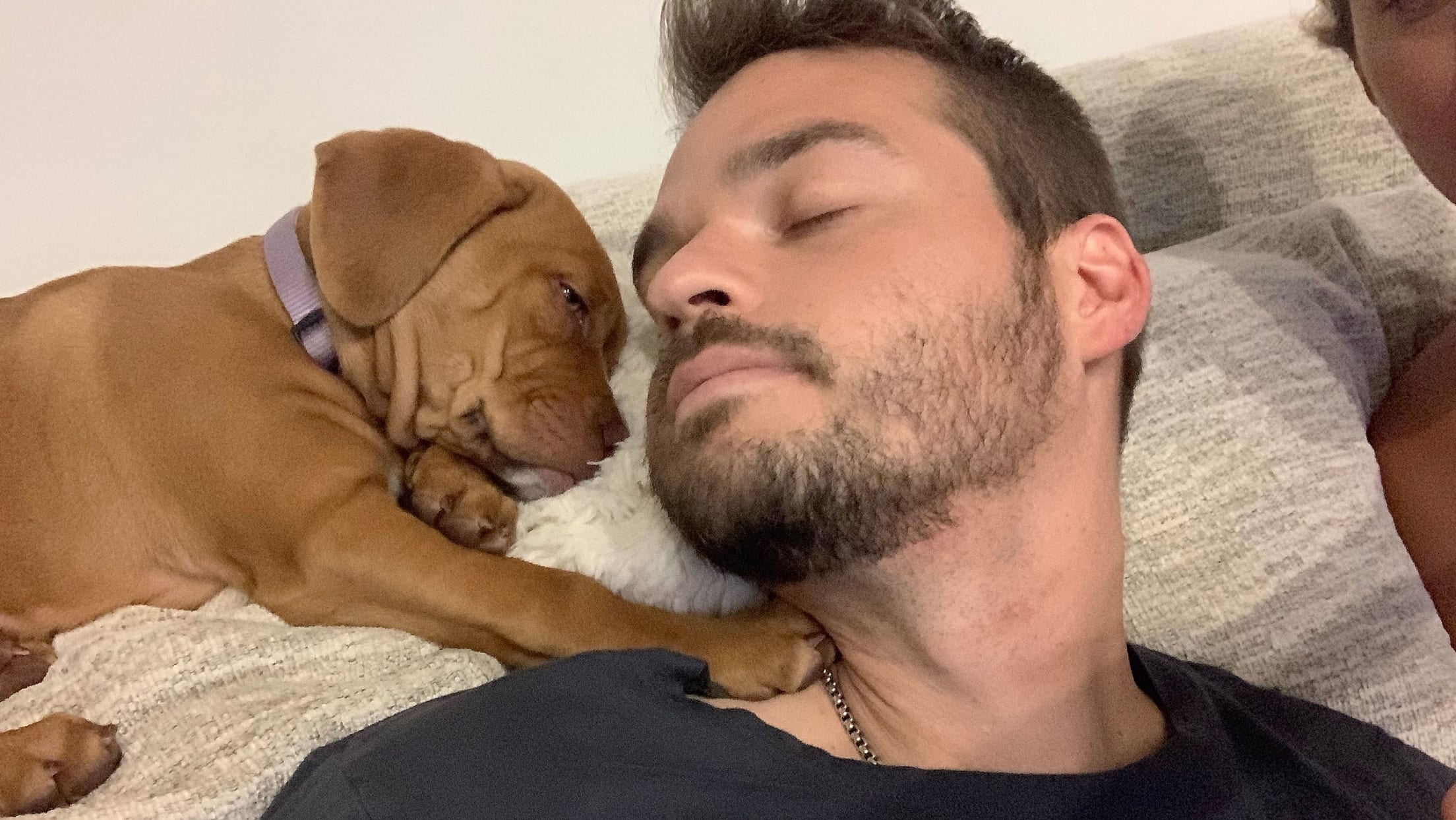
But then doctors administered the drug Oxaliplatin, and Mancini’s body did not respond well. His face flushed. His throat began to close. Doctors treated the allergic reaction, then called Perlman, who frantically searched -- unsuccessfully -- for an Uber to bring her up to Baltimore. She ended up borrowing a friend’s car, fighting traffic the entire way. Neither Mancini nor Perlman -- who worked the past two seasons as the O’s sideline reporter for MASN before leaving for NBC Sports -- ever felt further from the field than during that June day.
“That was really scary, because that was the first time something was going wrong during chemo,” Perlman said. “We were hoping he’d only have to do three months. Then the doctors suggested another three months. Which, when you’re going through it, might as well feel like another two years.”
The following treatment, doctors used Oxaliplatin again, hoping Mancini’s body would react differently. It did not, and the allergic reaction resurfaced. A period of re-evaluation followed, with Mancini, his family and doctors working together to map out new treatment plans and timelines. This was right around the time the Orioles were reconvening for Summer Camp, sporting #F16HT shirts to support Mancini’s recovery from afar. The 2020 season would go on after all. It would just go on without him.
“We’re thinking about him constantly,” manager Brandon Hyde said at the time. “To not have him in the lineup, to not have him around, is something that is not easy.”
************************************************************
Upon hearing the news of his diagnosis, the Orioles community embraced Mancini to the fullest. One of the first calls he received was from Brooks Robinson, the Hall of Fame third baseman and club ambassador emeritus. Another came from Mo Gaba, the teenager superfan Mancini befriended who, at the time, was waging his fourth cancer fight. Maryland Governor Larry Hogan, himself a cancer survivor, phoned Mancini personally and championed him on social media. Support poured in from across the baseball world, and Mancini remained engaged socially with his teammates and coaches through texts and group chats when able.
“It meant the world to me, the support I got from my teammates, and all the fans here,” Mancini said. “The fans in Baltimore have always been so amazing at rallying behind their players. It didn't surprise me in the slightest bit, the support I got. It meant so much and really helped me get through and get really excited to get back to playing baseball.”
But after the initial wave, Mancini spent his recovery largely removed from the baseball world. He spoke at least as much (if not more) to fellow colon cancer survivors, advocacy groups, and medical professionals. The #F16HT shirts spawned from Mancini’s desire to promote colorectal cancer awareness. Those efforts raised more than $80,000 for the Colorectal Cancer Alliance, which Mancini officially partnered with in June and plans to incorporate into the work of his new foundation.
A lot of people helped me out through my journey. Now, being able to inspire and help other people is what I see as returning the favor and something I want to do.
Trey Mancini
During and after his recovery, Mancini took every public opportunity he could to stress the importance of early colorectal cancer screening, noting how, if he weren’t a professional athlete with regular access to elite medical care, his may not have been detected until too late. He’s agreed to wave after wave of media requests this spring, often smiling as he answered similar questions again and again, knowing the potential his story had to touch millions.
“On average, patients diagnosed under the age of 50 go to two or three doctors before they are diagnosed. Then they get diagnosed at a later stage. That’s what is scary,” said Michael Sapienza, CEO of the Colorectal Cancer Alliance. “Trey has become a spokesperson for young people. What does it mean for them? Having gone through this in his 20s, what does it mean for insurance coverage? Men have a harder time talking about it given the taboo nature of the disease, but he came out really strong speaking on it.”
Said Mancini: “A lot of people helped me out through my journey. Now, being able to inspire and help other people is what I see as returning the favor and something I want to do.”
In that way, Mancini hopes to forge similar relationships to the one that’s blossomed with George Davis, a 64-year-old, two-time cancer survivor who regularly mentors new Hopkins patients. Hospital officials provided Davis’ contact info after Mancini’s surgery, during the week between surgery and chemo. Those were anxious, difficult days, sequestered in Perlman’s D.C. apartment as the pandemic took hold. Mancini dialed the number, wondering what to expect, searching for some sense of control.
“It's an arduous journey at times, regardless of how old you are and what kind of shape you’re in,” Davis said. “I knew he’d get through it fairly well, but I knew there'd be problems. And so we talked about those things. From our very first conversation, I was amazed and impressed with Trey’s acceptance of what he had, his will to fight and get back on the ballfield. But also, concurrently, he had this strong desire to give thanks and to give back in any way he could, from the very beginning. A lot of people don’t get to that point until they’re all the way through it.”
At least once per week throughout the summer, Mancini and Davis spoke by phone. They “talked a little bit about cancer, a little bit about survivorship, a little about faith,” Davis said. Their shared experience bonded them. Soon, Davis got to know Perlman, and Beth and Tony Mancini, too. When Gaba died in late July, Mancini mustered the strength to attend a socially distanced memorial service in Baltimore. Behind closed doors, he confided in Davis.
By the time Mancini’s final chemotherapy treatment came around in September, his physician’s assistant and Davis devised a plan. COVID restrictions prohibited Davis from going inside the hospital … but couldn’t legislate the parking lot grounds. He surprised Mancini with balloons and a bear hug. It was the first time they’d met in person.
“It's the worst news you can ever get when you get diagnosed with cancer, but there's a lot of people you're gonna meet along the way and people in your life that help you get through those really tough times,” Mancini said. “It’s not going to be easy going through chemotherapy. It takes a toll on you. But at the same time, I hope they know there is light at the end of the tunnel, and a lot of people go on to live normal lives. So you really have to think positive when you’re going through it.”
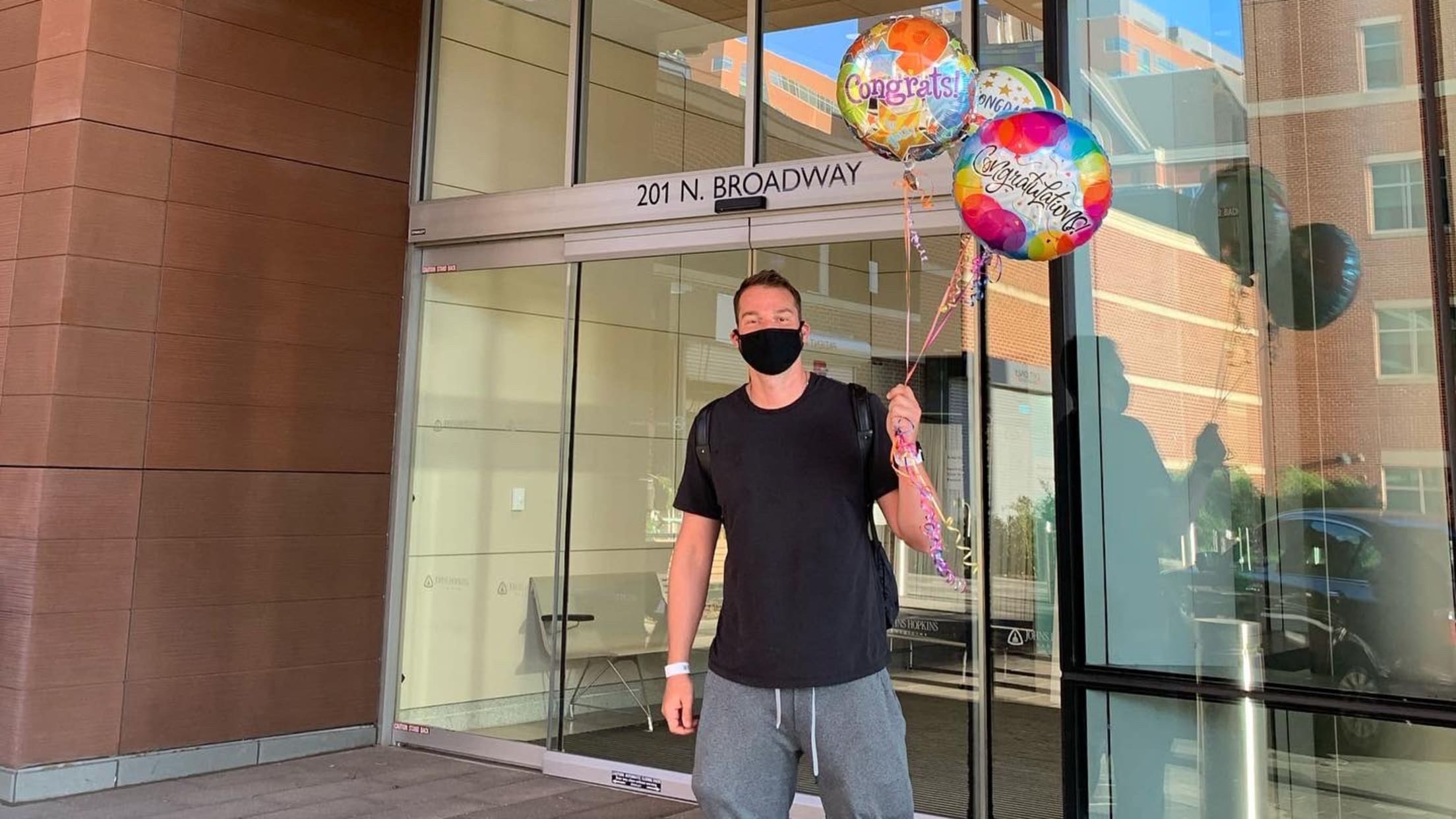
************************************************************
In the moment, of course, that wasn’t always easy. Quarantine made distractions scarce. The urgency of the situation could be overwhelming. And beating cancer requires focus.
The few weeks after his diagnosis were a blur. They were also, Mancini and Perlman both remember, the toughest: packed with visits from nurses, treatment tutorials and trepidatious trips to Hopkins. They became extremely COVID conscious, knowing Mancini was immunocompromised. He had to relearn what to eat, how to drink, when to sleep. It was a crash course in what chemo brings and how to beat it.
“I always joke we became like an amorphous blob, and I don’t know how else to put it because Trey and I were really in unison trying to make this work the best way we could,” Perlman said. "We literally spent every waking minute, hour and day together, because we just had to be so careful.”
Perlman and Mancini hadn’t been dating very long, merely six months or so into a relationship that began shortly after the 2019 season. Suddenly they weren’t just living together; she became his caretaker. Complicating things further was the pandemic, which made it extremely difficult -- and dangerous for Mancini -- for his immediate family to visit. The amorphous blob resolved to soldier on together.
“The hardest part was watching someone you really love -- the last thing you want to do is watch them feel like crap,” Perlman said. “We were learning so many things. It wasn't hard on a relationship by any means. It was just such a learning curve. I've never been in medicine. Trey has certainly never been in medicine. And we've never been that up close and personal with cancer in general. All of that was the hardest part. You’d much rather go through it than watch someone else go through it.”
Beth, Katie and Meredith were able to visit once, in late June. Dealing with her son’s situation from afar, Beth said that knowing Perlman was there to help him was “the only peace I had during that time.” The couple searched for their own peace by prioritizing their mental health. They read books about the power of positive thinking. They made house rules: no wallowing. Perlman decided if the day arrived when Mancini must break it, she would resolve not to.
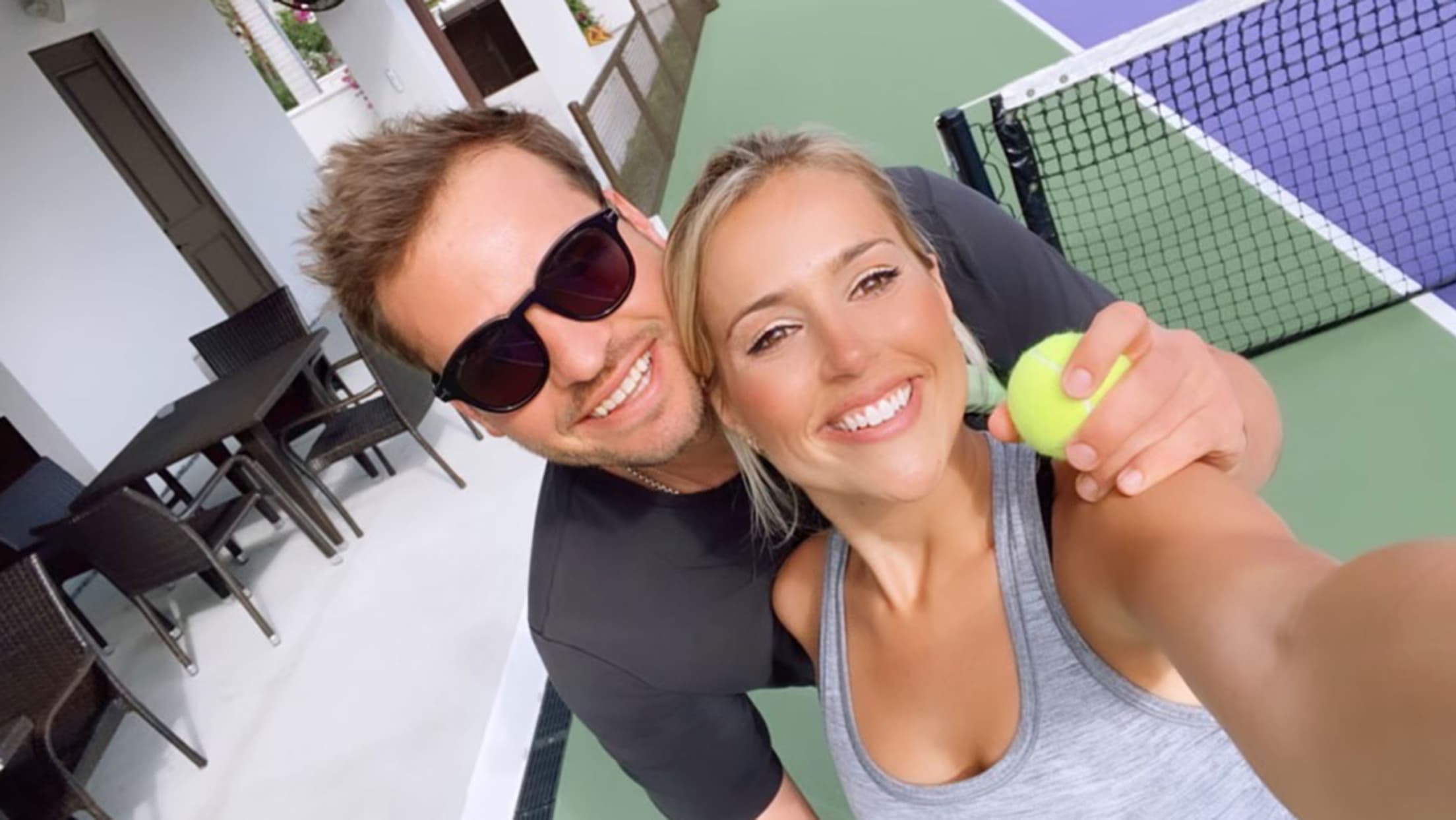
“We were never negative on the same day,” Perlman said. “It’s easy for me to say, ‘Stay positive, stay strong,’ when I'm not feeling like crap. When you feel miserable, you feel miserable. And he was really good about it most the time. But the days that he did feel really sad, he jokes that I would have to give him a kick in the ass.”
On those days, Perlman’s message was simple: “You’re going to get through this.” And he did. When the chemo fog cleared, Mancini would build up the strength to order from their favorite takeout joint, or flip on an Orioles game, or often even both. On these nights, Mancini angled himself in front of the television, grabbed a bat or some similarly shaped household item -- or sometimes just nothing, sometimes squeezing just air -- and envisioned batting against the pitcher on the screen. They were hardly even dry swings, but they were something. They were how one of baseball’s best players dealt when the game was taken away due to circumstances far from his control. Sometimes, something is everything.
“I got to watch a lot of baseball last year, definitely more than I ever have,” Mancini said. “Being in the locker room was really what I missed. It was really weird not being part of the team and being away from everybody.”
************************************************************
The end of summer brought the finish line, as it often does in baseball. For Mancini, it came on Sept. 21 in the Hopkins parking lot, smile as wide as the facemask covering it, balloons in hand. After doctors adjusted his treatment following the allergic reaction scare, Mancini completed his remaining chemotherapy sessions without issue. He’d seen his world shattered by cancer and eradicated it from his system in six months. Then he re-emerged into a changed world on a two-pronged mission: to use his story to help others and get himself back on the field.
Around Halloween, Mancini and Perlman left D.C. for Nashville, Tenn., where Mancini owns a home. There, he linked up with the trainers at Chadwick’s Fitness, an offseason strength and conditioning facility in nearby Franklin that’s become a hotbed for big league talent in recent years. This winter, that talent included Blue Jays starter Steven Matz, Mets catcher James McCann, Pirates infielder Adam Frazier and Tigers outfielder Christin Stewart.
“I was kind of surprised almost, to see him in such great shape,” Matz said. “It was awesome to see him working out and ramping up, being able to do all the same things we were doing, because I know how scary that type of thing could be.”
Matz was speaking from experience. His own personal scare with colon cancer came in 2014, when his mother, Lori, was diagnosed during Spring Training. Like Mancini, Lori Matz’s cancer had spread to her lymph nodes by time of detection, requiring surgery and chemotherapy. She’s since recovered fully. Matz called it “extremely inspiring to see someone at his age getting a diagnosis like that and bouncing back in a year.”
“He was always so positive and just so nice,” Matz said. “When you asked him how he's doing, he always thanked you for caring and asking. When I shared the stuff about my mom, he was always so appreciative of that. You could just tell he was so glad to be back.”
By November, Mancini was working out five times per week and doing light cage work. In time, the cage work transitioned to full batting practice. The lifting trended toward his normal, pre-illness workload. He was cleared to report to Spring Training without restriction, further positioning him to return healthy by Opening Day. Two weeks before pitchers and catchers were required to report to Sarasota, Mancini had enough of Nashville. Only a small welcome party celebrated his return to Orioles camp -- because he was one of the first players to arrive.
************************************************************
Nearly a year to the day after Trey’s colonoscopy, his parents made the same two-hour drive from their Winter Haven home south to Sarasota. The mood was demonstrably different.
Already back in O’s camp for a full month, Mancini had cleared enough hurdles to start their Grapefruit League opener against the Pirates, to find himself penciled into the No. 2 spot in Hyde’s lineup. Publicly, Mancini said he felt his comeback wouldn’t be complete until Opening Day, until the games counted, and this was merely an exhibition. But few others saw it that way, and privately, he spent that morning replaying the past year in his mind.
“When I pulled into the parking lot, it was emotional,” Beth said. “It’s emotional every year when we pull into the parking lot. But this year, it was exceptionally emotional.”
Watching from behind the third-base dugout, Beth, Tony and four close relatives were soon part of a standing ovation Mancini received prior to his first at-bat from the limited capacity Ed Smith Stadium crowd and both dugouts. He tipped his cap, soaked it in ... and promptly singled, rocketing his first hit in more than a year into center off Chad Kuhl. Footage of the ovation went viral, even though the game wasn’t televised. Hyde called it a “goosebumps moment.” Mancini called it “one of my favorite moments of my baseball career.”
“It definitely felt like a moment where we came full circle,” Mancini said. “I thought more about everything that happened today than I have in a long time. I’ve mostly tried to move on, in a lot of ways. But I really tried to appreciate and cherish today.”
The milestones kept coming. His first spring homer came March 19, off Pittsburgh righty Edgar Santana. His first opposite-field shot arrived three games later. He played in consecutive games, at first base and DH, his body passing every test of endurance and durability. He re-found his swing and hit .325 over his first 40 spring at bats.
“He’s just a very, very determined person,” Beth said. “I don't think it really hit me, if you want to know the truth, until this March. I don't know if I was going on adrenaline last year, but the anniversary of everything drove it home. What we went through, it's been emotional looking back at it.”
Said Hyde: “Trey is definitely meeting my expectations. My expectations are: I hope he feels good every day. He’s in a great place physically and mentally. It will be a daily conversation between me and him about whether he’s ready to go the next day. But every day I’ve asked him, he is. That’s going to continue for the rest of the season.”
If Mancini can regain even a fraction of his own form, he’ll provide a huge boost amid switch-hitting slugger Anthony Santander and exciting prospect Ryan Mountcastle in the middle of the rebuilding Orioles’ order. His impact, though, figures to transcend baseball, given Mancini’s platform, story, determination and resilience. His next two milestones will mark the biggest in a grueling, demoralizing, isolating, uplifting and triumphant year full of them: Opening Day, for real this time, April 1 at Fenway Park, and the April 8 home opener in Baltimore.
He will dig into the batter’s box having beaten cancer, and with the baseball world -- and beyond -- behind him.
“I'm very proud of where I am right now. Feeling like myself and feeling great is something I am very appreciative of and don’t take for granted at all,” Mancini said. “I’m hoping to take a lot of that perspective into this year. I really think I’m going to appreciate -- not that I didn’t before -- but I will really appreciate being able to play Major League Baseball every single day.”



